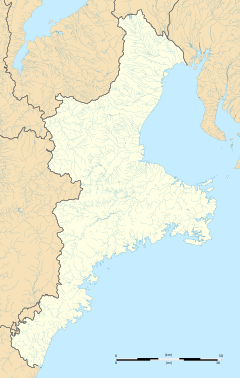Higashi-Aoyama Station
Higashi-Aoyama Station 東青山駅 | |||||
|---|---|---|---|---|---|
 Higashi-Aoyama Station | |||||
| General information | |||||
| Location | 1074 Uenomura, Tsu-shi, Mie-ken 515-2623 Japan | ||||
| Coordinates | 34°40′33″N 136°19′17″E / 34.6758°N 136.3215°E | ||||
| Operated by | |||||
| Line(s) | |||||
| Distance | 91.5 km from Ōsaka Uehommachi | ||||
| Platforms | 2 island platforms | ||||
| Other information | |||||
| Station code | D56 | ||||
| Website | Official website | ||||
| History | |||||
| Opened | December 20, 1930 | ||||
| Passengers | |||||
| FY2019 | 36 daily | ||||
| |||||

Higashi-Aoyama Station (東青山駅, Higashi-Aoyama-eki) is a passenger railway station in located in the city of Tsu, Mie Prefecture, Japan, operated by the private railway operator Kintetsu Railway.
Lines
[edit]Higashi-Aoyama Station is served by the Osaka Line, and is located 91.5 rail kilometers from the starting point of the line at Ōsaka Uehommachi Station.[1]
Station layout
[edit]The station was consists of two opposed island platforms, connected by an underground passage. The station is unattended.
Platforms
[edit]| 1, 2 | ■ Osaka Line | for Ise-Nakagawa, Ujiyamada, Kashikojima, and Nagoya |
| 3, 4 | ■ Osaka Line | forNabari, Yamato-Yagi and Osaka Uehommachi |
Adjacent stations
[edit]| « | Service | » | ||
|---|---|---|---|---|
| Osaka Line | ||||
| Nishi-Aoyama | Local | Sakakibara-Onsenguchi | ||
| Nishi-Aoyama | Express | Sakakibara-Onsenguchi | ||
| Rapid Express: Does not stop at this station | ||||
History
[edit]Higashi-Aoyama Station opened on December 20, 1930 as a station on the Sangu Kyuko Electric Railway. After merging with Osaka Electric Kido on March 15, 1941, the line became the Kansai Kyuko Railway's Osaka Line.[2] This line was merged with the Nankai Electric Railway on June 1, 1944 to form Kintetsu.[2] On October 25, 1971, due to failure of an ATS system in Aoyama Tunnel, a runaway limited express train derailed in Sodani Tunnel near this station and collided head on with another one, with 25 fatalities (article in Japanese). On November 25, 1975, after a landslide obliterated part of the tracks between this station and Sakakibara-Onsenguchi Station, the tracks were rerouted slightly, a new tunnel was constructed, and a new station building was built. On February 27, 2009 a derailment of a local train occurred at this station, but without fatalities.
Passenger statistics
[edit]In fiscal 2019, the station was used by an average of 36 passengers daily (boarding passengers only).[3]
Surrounding area
[edit]- Aoyama Highlands
- Nunobiki Waterfall
See also
[edit]References
[edit]External links
[edit]![]() Media related to Higashi-Aoyama Station (Mie) at Wikimedia Commons
Media related to Higashi-Aoyama Station (Mie) at Wikimedia Commons
- Kintetsu: Higashi-Aoyama Station(in Japanese)


